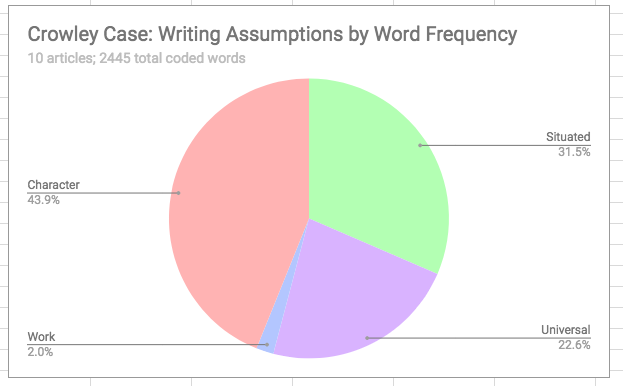The Crowley Case
On Truth and Trust, or Is Writing Character?
Crowley Intro
An early nominee of the Trump Administration, Monica Crowley was put forward as senior director of strategic communications for the National Security Council in December 2016 (Washington Post Staff, 2016). A conservative media commentator, Crowley was then a Fox News contributor with a bestselling book What the (Bleep) Just Happened (2012). A few weeks after the transition team announced her name, both CNN and Politico published allegations of plagiarism, complete with detailed comparisons (Caton & Watkins, 2017; Kaczynski, 2017).
CNN reported plagiarism throughout the 2012 book; the Politico article reviewed Crowley’s 2000 doctoral dissertation for Columbia University. While the Trump transition team rejected the charges, Crowley declined the position within a week of the published reports, and HarperCollins, her publisher, quickly ceased selling the online edition of her book (Haberman, 2017). HarperCollins later announced they would not sell the book until revisions were made (Sterne, 2017).
Crowley’s case thus differs from those of Gorsuch and Bialosky, both of whom weathered their charges and whose work remained in print at the time of this webtext’s publication. However, Crowley’s case also involved far more instances of plagiarism, both in number of issues and number of texts. Crowley’s case also differed in terms of argument; it represents the most attention to a belief of writing as linked to character. Perhaps unsurprisingly, Crowley’s defenders also picked up character arguments, in that they attacked the character of those accusing Crowley of plagiarism.
"In regards to Monica Crowley's rampant plagiarism and her joining the new administration's National Security Council staff ("Is plagiarism an unpardonable sin any more?" Thursday), it again seems that this incoming administration isn't concerned with ethical behavior." —Yvonne Martin, 2017
"There aren't just a few isolated instances but a whole truckload of them. It's not just plagiarism in a column—when it can be difficult to attribute every single thing—but books and dissertations. More important, unlike in the other cases mentioned above, Crowley has never admitted to any wrongdoing.” —Daniel W. Drezner, 2017
Coding Results
Arguments defending and supporting Monica Crowley developed mainly around the assumption that writing reveals character. Allard (2017) defended Crowley by reaffirming her moral character and lamented the lasting personal damage inflicted by plagiarism charges: "But where do you go to have your reputation restored?" On the other side, Allison Stanger (2017) opened her charge against Crowley by arguing "Honesty and integrity are as important for national security as they are in the quest for knowledge. If Crowley were to serve in a Trump administration, she, like my students, would have had to promise to maintain the highest ethical standards." She concluded that "Crowley's dissertation and book are clear instances of intellectual dishonesty," therefore arguing that Crowley's plagiarism indicates an unethical character, unable to handle the proposed role.

Stanger's condemnation of Crowley's character sits neatly alongside her arguments that writing has some universal aspects, which appear in this case as 23% of the total argument types. For example, she wrote "Middlebury's academic handbook defines plagiarism as 'passing off another person's work as one's own' and maintains a strict commitment to combating it. . . . The quality of evidence for any argument cannot be evaluated if a scholar does not make the sources for each of the argument's building blocks crystal clear." Hence, plagiarism codes underscore the larger mission of the academy, "the pursuit of truth," as she defined it (2017).
Circulating Theories of Writing
Writing is Situated sees discourse communities as setting citation norms; insiders and plagiarizers judge best; professional standing refutes plagiarism.
Writing Requires Work assumes all writing requires intellectual labor (Roach, 2017) and so all writing deserves source-crediting; the writing process is difficult.
Writing Means Ideas takes up the solitary genius definition of writing, where novel ideas and original arguments matter and boilerplate language or facts do not.
Some of Writing is Universal argues some writing principles, e.g., giving credit, apply to all situations; college teaching and plagiarism policies serve as general benchmarks.
Writing Reflects Character views the act of writing as inherently ethical; intention matters, and writing decisions reflect one's overall character.
Writing Means Expression all work is intertextual, so the form and language used to convey ideas is what matters; reworking ideas is fair use.